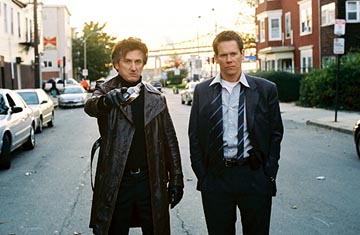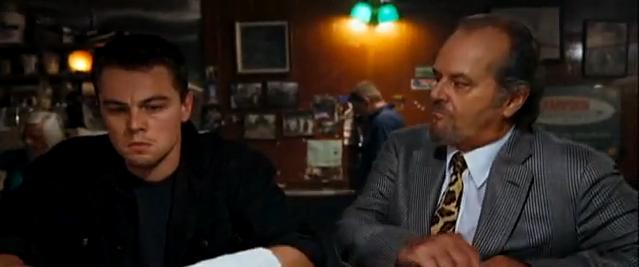 Thomas Cahill’s book, How the Irish Saved Civilization recalls Hibernia rescuing western culture after the fall of imperial Rome. In Ireland, men like Saints Patrick and Columba founded a Christian monastic tradition that preserved, copied and then spread ancient texts via-missionary to the rampaging pagan tribes that brought down the empire. Cahill quotes Kenneth Clark that “for quite a long time – almost a hundred years – western Christianity survived by clinging to places like Skellig Michael, a pinnacle of rock eighteen miles from the Irish coast, rising seven hundred feet out of the sea.” Centuries later, Irish immigrants would leave the Emerald Isle and settle on another small spit of land that juts out east from Dorchester, just south of Boston proper – referred to by many locals as “Southie.” In films, this longtime working-class Irish-American stronghold is anything but a place for peaceful religious scribblers. Rather, it’s famous cinematic residents (usually Irishmen with chips on their shoulders) have excelled at the tribal violence of old.
Thomas Cahill’s book, How the Irish Saved Civilization recalls Hibernia rescuing western culture after the fall of imperial Rome. In Ireland, men like Saints Patrick and Columba founded a Christian monastic tradition that preserved, copied and then spread ancient texts via-missionary to the rampaging pagan tribes that brought down the empire. Cahill quotes Kenneth Clark that “for quite a long time – almost a hundred years – western Christianity survived by clinging to places like Skellig Michael, a pinnacle of rock eighteen miles from the Irish coast, rising seven hundred feet out of the sea.” Centuries later, Irish immigrants would leave the Emerald Isle and settle on another small spit of land that juts out east from Dorchester, just south of Boston proper – referred to by many locals as “Southie.” In films, this longtime working-class Irish-American stronghold is anything but a place for peaceful religious scribblers. Rather, it’s famous cinematic residents (usually Irishmen with chips on their shoulders) have excelled at the tribal violence of old. Over the past century, landfill has physically merged Southie more and more with the mainland, but hasn’t dulled it’s razor edge. The opening narration of The Departed comes courtesy of Irish gangster, Frank Costello, who declares “I don’t want to be a product of my environment. I want my environment to be a product of me. Years ago we had the church. That was only a way of saying we had each other.” The words are spoken over old news footage of Southie’s ugly side, showing violent reaction to public school desegregation (“the busing riots”) in the 1970’s. This was also the heyday of Southie native (and partial-Costello inspiration) James “Whitey” Bulger – the fugitive mob boss and FBI informant who’s evaded arrest for years, thanks in part to tip-offs from corrupt former-FBI agent, John Connolly.
Over the past century, landfill has physically merged Southie more and more with the mainland, but hasn’t dulled it’s razor edge. The opening narration of The Departed comes courtesy of Irish gangster, Frank Costello, who declares “I don’t want to be a product of my environment. I want my environment to be a product of me. Years ago we had the church. That was only a way of saying we had each other.” The words are spoken over old news footage of Southie’s ugly side, showing violent reaction to public school desegregation (“the busing riots”) in the 1970’s. This was also the heyday of Southie native (and partial-Costello inspiration) James “Whitey” Bulger – the fugitive mob boss and FBI informant who’s evaded arrest for years, thanks in part to tip-offs from corrupt former-FBI agent, John Connolly.  Costello’s belief in closing ranks is demonstrated by the failure of police and the church to protect young Southie native, Dave Boyle from abduction by two child molesters (one, apparently, a smiling catholic priest) posing as police officers in the opening minutes of Mystic River. Years later, the teen daughter of Dave’s friend is murdered, and the tight-knit Irish community (which has treated Dave as damaged goods) soon turns it’s suspicions on him. The unspoken significance of a molesting clergyman was not lost on 2003 audiences well-versed in public scandals of Catholic leadership shielding predators from prosecution. Yet 20 years prior, bringing a medical malpractice charge against the Archdiocese of Boston over a botched procedure in a catholic hospital was risky enough that only an alcoholic washout lawyer (more used to drumming up business in Southie funeral homes) takes the case in 1982’s The Verdict.
Costello’s belief in closing ranks is demonstrated by the failure of police and the church to protect young Southie native, Dave Boyle from abduction by two child molesters (one, apparently, a smiling catholic priest) posing as police officers in the opening minutes of Mystic River. Years later, the teen daughter of Dave’s friend is murdered, and the tight-knit Irish community (which has treated Dave as damaged goods) soon turns it’s suspicions on him. The unspoken significance of a molesting clergyman was not lost on 2003 audiences well-versed in public scandals of Catholic leadership shielding predators from prosecution. Yet 20 years prior, bringing a medical malpractice charge against the Archdiocese of Boston over a botched procedure in a catholic hospital was risky enough that only an alcoholic washout lawyer (more used to drumming up business in Southie funeral homes) takes the case in 1982’s The Verdict.  Much of the movie was shot in New York to avoid infamous production challenges (Teamsters shakedowns and an armed heist of film reels) that plagued William Friedkin’s Boston-shot The Brink’s Job four years earlier. This left Southie with many of Verdict‘s necessary location shots – a situation that would repeat itself 15 years later when the shoot for Good Will Hunting was split between studio-encouraged Toronto, and the Boston locales envisioned by writers/stars Ben Affleck and Matt Damon. One of the most prominent is Will’s three-decker rowhouse (a recurring Southie/Dorchester architectural signifier) on Fifth Street, and the South Boston District Municipal Court where he spends some time between arrests and cleaning floors at MIT in Cambridge. That part of town probably swarms with the kind of well-to-do “lace curtain” Irishmen The Departed‘s Sgt. Dignam despises almost as much as Billy Costigan’s North Shore/Southie “double kid” upbringing. “You have different accents?” he asks Costigan. “You did, didn’t you, you little fuckin’ snake. You were like
Much of the movie was shot in New York to avoid infamous production challenges (Teamsters shakedowns and an armed heist of film reels) that plagued William Friedkin’s Boston-shot The Brink’s Job four years earlier. This left Southie with many of Verdict‘s necessary location shots – a situation that would repeat itself 15 years later when the shoot for Good Will Hunting was split between studio-encouraged Toronto, and the Boston locales envisioned by writers/stars Ben Affleck and Matt Damon. One of the most prominent is Will’s three-decker rowhouse (a recurring Southie/Dorchester architectural signifier) on Fifth Street, and the South Boston District Municipal Court where he spends some time between arrests and cleaning floors at MIT in Cambridge. That part of town probably swarms with the kind of well-to-do “lace curtain” Irishmen The Departed‘s Sgt. Dignam despises almost as much as Billy Costigan’s North Shore/Southie “double kid” upbringing. “You have different accents?” he asks Costigan. “You did, didn’t you, you little fuckin’ snake. You were like different people.” This coming from the now-wealthy Dorchester-born Mark Wahlberg, who disappears into his working-class Bay Stater roles for both The Fighter and The Perfect Storm. Yet it’s brother Donnie’s turn as the prodigal son Danny Quinn in Southie that shows how family allegiances to the local Irish mafia can complicate efforts to stay on the right side of Boston law enforcement. And the law goes right out the window when two Irish Southie brothers take the disposal of Boston’s organized crime into their own hands as every juvenile wannabe vigilante’s favorite set of pea coat-sporting homicidal maniacs: The Boondock Saints. Unlike other Southie films, this one is less working-class chronicle, than ancient opera – complete with hero killers sporting Latin “Veritas” and Aequitas” tattoos leaving boatman coins in victims eyes. Since an Italian mafioso is their target, the mission-from-God MacManus brothers operate like two especially aggressive Skellig Michael monks who shun the peace of the monastery to get in on sacking Rome.
different people.” This coming from the now-wealthy Dorchester-born Mark Wahlberg, who disappears into his working-class Bay Stater roles for both The Fighter and The Perfect Storm. Yet it’s brother Donnie’s turn as the prodigal son Danny Quinn in Southie that shows how family allegiances to the local Irish mafia can complicate efforts to stay on the right side of Boston law enforcement. And the law goes right out the window when two Irish Southie brothers take the disposal of Boston’s organized crime into their own hands as every juvenile wannabe vigilante’s favorite set of pea coat-sporting homicidal maniacs: The Boondock Saints. Unlike other Southie films, this one is less working-class chronicle, than ancient opera – complete with hero killers sporting Latin “Veritas” and Aequitas” tattoos leaving boatman coins in victims eyes. Since an Italian mafioso is their target, the mission-from-God MacManus brothers operate like two especially aggressive Skellig Michael monks who shun the peace of the monastery to get in on sacking Rome.
4 minutes read
South Boston, MA
4 minutes read